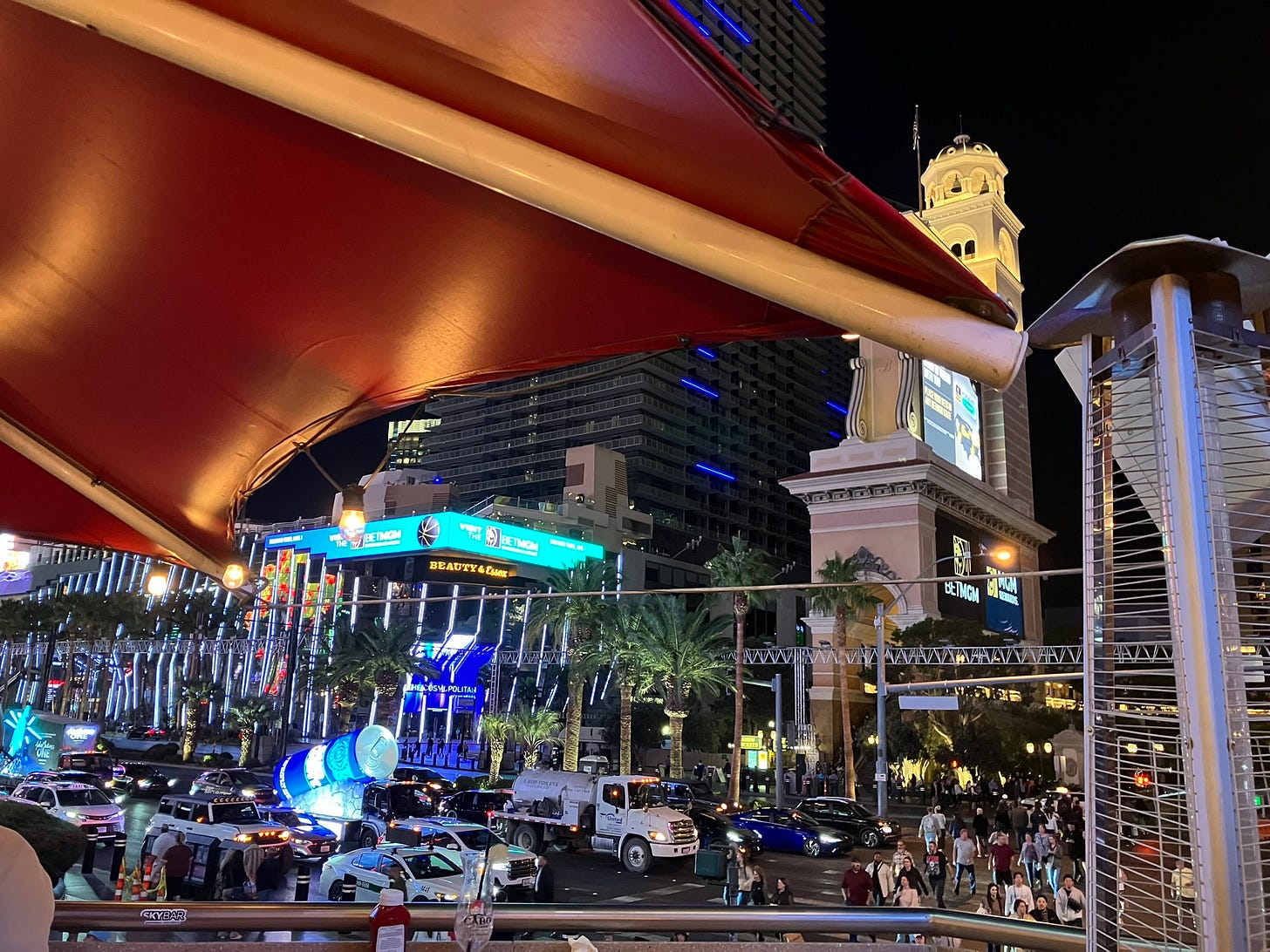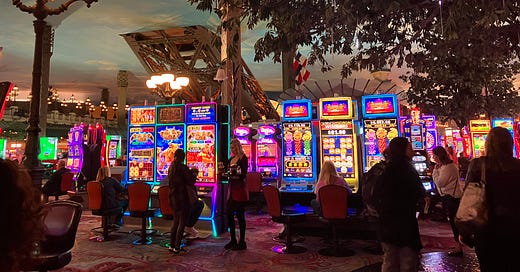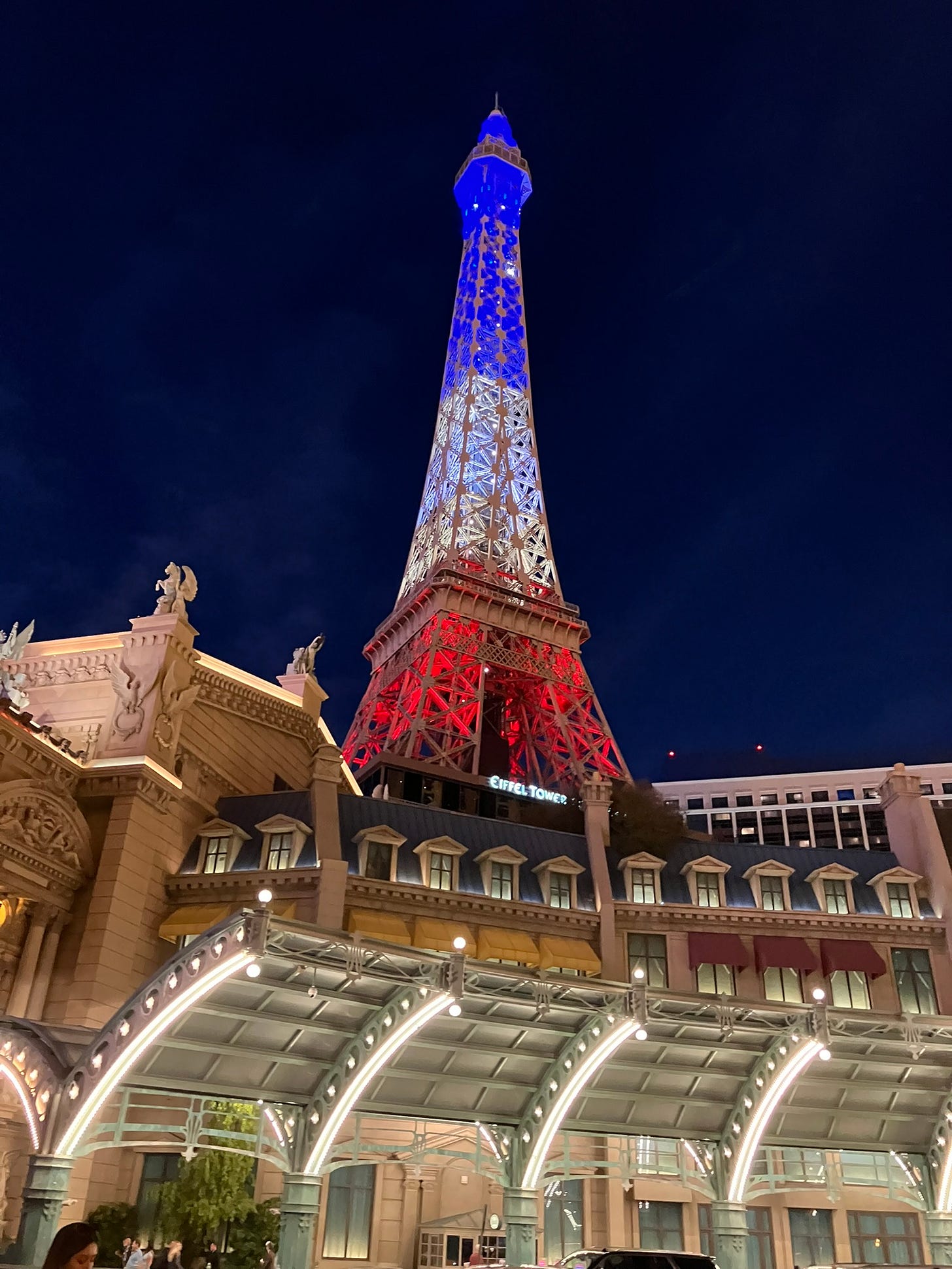I’m on a plane as I write this, leaving one of the strangest places on earth. Time and space warps there— with no windows to orient you to either and constant overstimulation as slot machines everywhere blink and beep. Before the trip, my mother joked that I should set a $100 limit for gambling but in fact I never went near any of the tables or machines (does that mean I’m up $100?). As the friend I was with said, no one sitting there ever looks happy.
I was in Las Vegas for a writers conference, or rather, a publishing conference. There was very little discussion of craft but a lot of talk about business and productivity. It is and isn’t my world. I’ll try to explain.
Author Nation is a community of indie and self-published writers that began a few years ago as a conference called 20 Books to $50K. The idea was that if you had a backlist of at least twenty books you published and managed yourself you could earn at least $50K (a month, they claim!) because cross-marketing a critical mass would benefit all of them. Readers would cross over from one book to another and you’d keep the books coming for constant circulation. This works best for genre fiction, of course, where binge reading is more likely than for non-fiction or literary fiction, but it’s more of an entrepreneurial worldview than a literary movement. The writers involved care about quality but they get really excited by quantity.
In most ways, this isn’t my world. I self-published a middle-grade historical novel in 2011 and have tried out writing genre fiction, but my training is academic and “high canon.” Still, I’m a voracious and omnivorous reader— from mysteries, romances, thrillers, and sci fi/fantasy to memoirs and biography. I actually read very little new literary fiction, though that’s not a statement of any kind, that’s just how it works out. I’ve stopped trying to interpret that, and I try to avoid judgment; reading is one activity where I can do exactly as I please.
I attended this conference because I may end up self publishing the memoir I’ve been sharing with you all. And because I spent last year drafting a Victorian mystery/thriller with Christina Boufis, a dear friend of mine and another ex-academic who has already self-published several mysteries. We had trained together as Victorianists thirty years ago and decided to go back in time. We started working on a Jack-the-Ripper-meets-Dracula novel set in 1888, trading a Google doc back and forth—which turned out to be a ton of fun. Last week we met up in person for this conference, which was an extra treat.
The panels could get pretty technical (BISAC categories, anyone? ROAS, or return on ad spend?) but most were very inspiring. These writers have carved careers for themselves pursuing their own niche interests and controlling their own intellectual property. To do that they had to learn how to be business people and distributors and marketers. They were here in Las Vegas to share what they had learned and keep growing. They are unabashed nonconformists, with many walking around in elaborate Comic-Con-style costumes or plain old tiaras. By becoming their own publishers they avoid gatekeeping and foster cooperation. The whole conference had a generous vibe— with people hanging around to attend each other’s talks and mingling afterwards. It was diverse and welcoming.
There were some interesting internal contradictions on display, mostly between the “rapid release” crowd, perhaps left over from the 20 Books to $50K conference, and the “artisan author” crowd, who believe in slowing down and building relationships with readers (though those relationships often include merch). The rapid release people talk casually about publishing a book a month, and both welcome and fear the next generation of AI that will either help them accelerate their mass production even further… or drive them out of business. The artisan author folks believe they can use AI to offload the parts of their process they don’t enjoy (whether marketing or creating visuals or outlining a plot) so they can focus even more on connecting with readers. Joanna Penn seems to be the foremost advocate of this latter group, and she gave a spirited and well-informed talk about what trends writers should expect in the marketplace in 2025.1
Overall, it was an (over)stimulating and thought-provoking week that I’ll spend some time absorbing. I have reams of handwritten notes and PDF handouts. They will release recordings. Like Vegas itself, it was a flood—

My personal takeaways:
Make one last push to publish the memoir with a small press before publishing it myself. Send it out to as many as I can find and see what happens. In the years since I finished it I’ve only sent it out to one place at a time, and then waited…to no avail. In the vocabulary of the business world, I need to scale.
Send out the Victorian mystery MS to a few mystery presses before embarking seriously on the self-publishing route with Christina. It’s daunting; we need a joint website, an ISBN, and freelance vendors to proofread and design a cover. We need to format versions for different platforms, from choosing print trim sizes to Apple Books epub to Kindle’s proprietary file format, depending on whether we go exclusive or “wide.” We’ve both done it before and know it’s A LOT.
Get out more. I can see that I have not entirely rebuilt my life after the pandemic2 and it was nice to remember that I still have a few social skills. I didn’t quite “network” but I met some great people and had some interesting conversations, which is the point.
Resources
Finally, some of you may be interested in some of the newer writerly tools I learned about at Author Nation (I haven’t tried them yet myself):
NotebookLM and Notion help conduct and organize research. I heard many enthusiastic reports on their AI features, which can synthesize and streamline information within a trusted data source. That is, you upload or define the sources you want them to search and it scours them for you.
Plaud is a device I saw someone using and heard others recommend that uses AI to transcribe speech directly to text. Someone sitting next to me at a panel used the tiny gadget to take notes by recording them and then retrieving the digital text file later. Someone else described a workflow where they used a lapel pin to dictate parts of their novel while walking the dog (!).
Marlowe is an AI-driven editing tool that helps writers analyze their novels. Beyond the usual copyediting or proofreading suggestions, it also suggests comparable titles, which can be useful if you’re writing a marketing proposal.3
Thank you for reading this far! I hope you enjoyed this visit to a rather exotic land with me. I look forward to your thoughts and will respond to everyone.
She was also the only person at the conference whom I ever heard mention our recent election— and she’s British. It was as if there was a conscious decision, in that swing state and the aftermath, to pretend it never happened. Even the city itself seemed scrubbed of any political content, though it must have been billboarded all over just ten days ago. Has it only been ten days?? I have been on a rollercoaster of emotions that I’m still processing.
Here’s hoping I don’t come down with COVID again in a few days after all this exposure. I got my booster. I wore a mask during travel, but not at the hotel or in the panels. That was my gamble.
Yes, AI, AI, AI. There’s going to be no escaping it so we should consider best practices. Marlowe and NotebookLM, for example, do not re-use or re-sell the material uploaded for analysis. Plaud, on the other hand, does “commercially exploit” the de-identified data it collects. These are situations for carefully weighing pros and cons and reading all the privacy agreements we tend to skim.






Nice, informative essay. I, too, went to Las Vegas some years ago for a literary reason. I was moderating a panel at the University, consisting of ex Peace Corps Volunteers: Paul Theroux, Peter Hessler, and Mary-Ann Tirone Smith. The topic was Bringing the World Home. The irony of having it in Las Vegas was too hilarious to ignore.
You are Very brave! A whole other side to your journey.. and AI. I need to pull my head from the sand